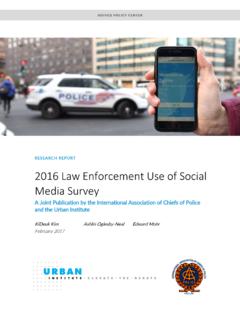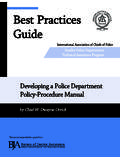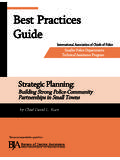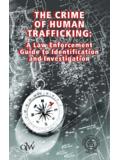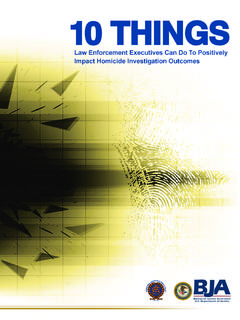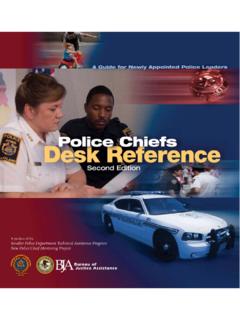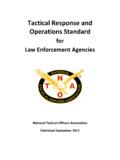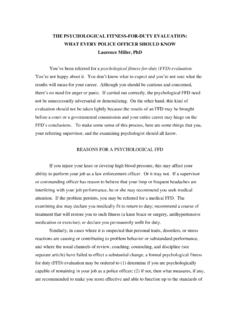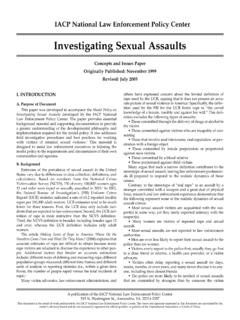Transcription of Acknowlegements - The International Association …
1 Bureau of Justice Department of JusticeInternational Association of Chiefs of Police515 N. Washington StreetAlexandria, Virginia 22314P: An Analysis by the International Association of Chiefs of Police13 The International Association of Chiefs of PoliceThe International Association of Chiefs of police is the world s oldest and largest nonprofit membership organization of police executives, with over 20,000 members in over 100 different countries. IACP s leadership consists of the operating chief executives of International , federal, state and local agencies of all sizes. Founded in 1893, the Association s goals are to advance the science and art of police services; to develop and disseminate improved administrative, technical and operational practices and promote their use in police work; to foster police cooperation and the exchange of information and experience among police administrators throughout the world; to bring about recruitment and training in the police profession of qualified persons; and to encourage adherence of all police officers to high professional standards of performance and conduct.
2 Since 1893, the International Association of Chiefs of police has been serving the needs of the law enforcement community. Throughout the past 114 years, we have been launching historically acclaimed programs, conducting ground-breaking research and providing exemplary programs and services to our membership across the globe. Professionally recognized programs such as the FBI Identification Division and the Uniform Crime Records system can trace their origins back to the IACP. In fact, the IACP has been instrumental in forwarding breakthrough technologies and philosophies from the early years of our establishment to the present.
3 From spear-heading national use of fingerprint identification to partnering in a consortium on community policing to gathering top experts in criminal justice, the government and education for summits on violence, homicide, and youth violence, IACP has realized our responsibility to positively effect the goals of law enforcement. Even with such an esteemed history, we are continually initiating programs to address the needs of today s law enforcement professionals. Our members have let us know that they consider IACP to be a progressive organization, successfully advancing the law enforcement profession.
4 If you would like additional information about the IACP, please contact IACP Headquarters at 1-800-THE-IACP (1-800-843-4227) or visit our website at International Association of Chiefs of police 515 N. Washington Street Alexandria, Virginia 22314800-THE International Association of Chiefs of police (IACP) would like to acknowledge the Bureau of Justice Assistance (BJA), JEHT Foundation, and the Substance Abuse and Mental Health Services Administration (SAMSHA) for their support of the Improving police Response to Persons with Mental Illness Summit and the completion of this report.
5 We would also like to thank IACP leadership, staff and the Summit Advisory Group for their StaffDaniel RosenblattExecutive DirectorJames McMahonDeputy Executive DirectorSummit Staff Dianne Beer-MaxwellProject ManagerAmanda CardoneTraining CoordinatorDeborah ChandlerTraining CoordinatorCarrie CorsoroResearch CoordinatorElaine DeckSenior Program ManagerChuck EverhartSystems Software ManagerIan HamiltonProject CoordinatorJeffrey HarringtonActing Project ManagerKim KohlheppTesting Center ManagerTegan MahfordInternMichael SpochartVisiting Fellow Teri MartinReport WriterJohn FirmanDirector of ResearchMeredith MaysLegislative
6 RepresentativePatrice MejiasInternDanielle MenardProject AssistantMackenzie RichardsonInternMichael RizzoProject ManagerMichael RobinsonVisiting FellowTamika ScottTechnical Assistance CoordinatorCheena SinghProject SpecialistWhitney KujawaProject AssistantNancy TurnerSenior Program ManagerBill WallsVisiting FellowThis project was supported by Grant No. 2008-DD-BX-0277 awarded by the Bureau of Justice Assistance. The Bureau of Justice Assistance is a component of the Office of Justice Programs, which also includes the Bureau of Justice Statistics, the National Institute of Justice, the Office of Juvenile Justice and Delinquency Prevention, and the Office for Victims of Crime.
7 Points of view or opinions in this document are those of the author and do not represent the official position or policies of the Department of Justice. AcknowlegementsFunding for this conference was made possible in part by support from the Substance Abuse and Mental Health Services Administration. The views expressed in written conference materials or publications and by speakers and moderators do not necessarily reflect the official policies of the Department of Health and Human Services; nor does mention of trade names, commercial practices, or organizations imply endorsement by the International Association of Chiefs of police is the world s oldest and largest nonprofit membership organization of police executives, with over 20,000 members in over 100 different countries.
8 IACP s leadership consists of the operating chief executives of International , federal, state and local agencies of all sizes. Founded in 1893, the Association s goals are to advance the science and art of police services; to develop and disseminate improved administrative, technical and operational practices and promote their use in police work; to foster police cooperation and the exchange of information and experience among police administrators throughout the world; to bring about recruitment and training in the police profession of qualified persons; and to encourage adherence of all police officers to high professional standards of performance and conduct.
9 Since 1893, the International Association of Chiefs of police has been serving the needs of the law enforcement community. Throughout the past 114 years, we have been launching historically acclaimed programs, conducting ground-breaking research and providing exemplary programs and services to our membership across the globe. Professionally recognized programs such as the FBI Identification Division and the Uniform Crime Records system can trace their origins back to the IACP. In fact, the IACP has been instrumental in forwarding breakthrough technologies and philosophies from the early years of our establishment to the present.
10 From spear-heading national use of fingerprint identification to partnering in a consortium on community policing to gathering top experts in criminal justice, the government and education for summits on violence, homicide, and youth violence, IACP has realized our responsibility to positively effect the goals of law enforcement. Even with such an esteemed history, we are continually initiating programs to address the needs of today s law enforcement professionals. Our members have let us know that they consider IACP to be a progressive organization, successfully advancing the law enforcement profession.

